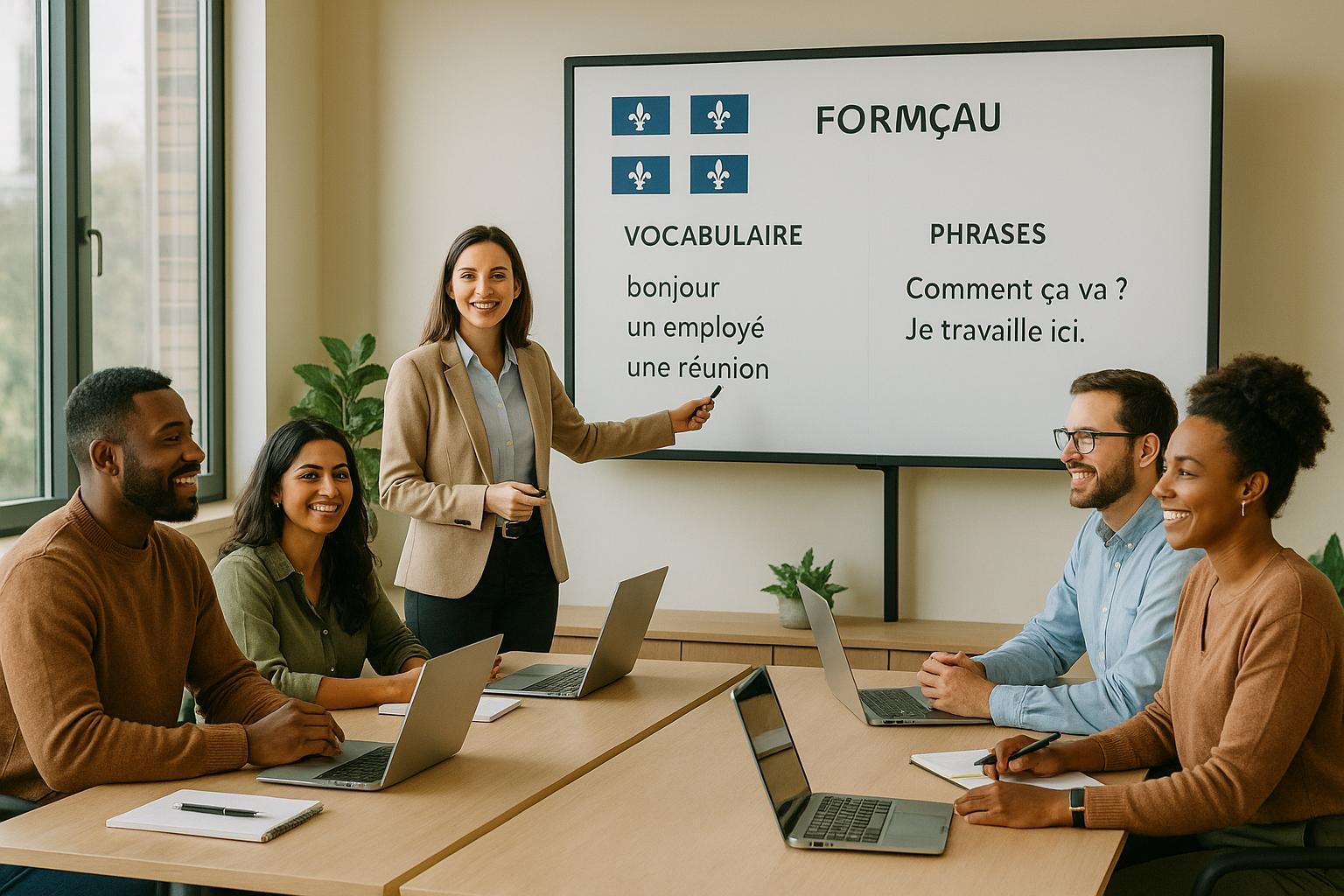How French affects the visa renewal of Quebec employees
Quebec's Bill 96 introduces new French language requirements impacting visa renewals for foreign workers and employer compliance in 2025.

How French affects the visa renewal of Quebec employees
Quebec's new French language requirements, tied to Bill 96, will impact visa renewals for temporary foreign workers starting in fall 2025. Workers must demonstrate Level 4 oral French proficiency by 2028 to renew their work permits, with exceptions for the agriculture sector. Employers face stricter rules, including mandatory French use in workplaces and potential fines for non-compliance. Key points:
- Workers: Must meet French proficiency standards or risk visa expiration after 36 months.
- Employers: Required to prioritize French in hiring, communication, and training.
- Penalties: Fines range from $3,000 to $30,000 for businesses, doubling for repeat offences.
- Support: AI-driven tools like Francoflex offer scalable solutions for language training.
These changes aim to strengthen French in Quebec but pose challenges for both employees and businesses.
Quebec Immigration Reset 2025–29: New Rules for Foreign Workers & PR
Bill 96 Requirements for Visa Renewals

Bill 96 introduces new French language requirements for visa renewals in Quebec, setting clear expectations for both employees and employers. These updated regulations aim to reinforce the use of French in workplaces and other areas of public life. Here's a closer look at the language proficiency standards, employer responsibilities, and the penalties tied to non-compliance.
Required French Skills Under Bill 96
The legislation outlines specific French proficiency levels depending on an applicant's eligibility. For instance, individuals not covered by the Certificate of Eligibility for AEC programs must meet the following benchmarks:
- Oral French: Level 7 proficiency (comprehension and expression)
- Written French: Level 4 proficiency (comprehension and expression)
These levels are based on the "Échelle québécoise des niveaux de compétence en français des personnes immigrantes adultes" [3][4][5]. To help individuals meet these standards, educational institutions have started offering targeted French training and testing services. This shift highlights the growing emphasis on language skills in both education and employment settings.
What Employers Must Do for Workplace Francisation
Employers play a crucial role in supporting French language use under Bill 96, which requires French to be the primary language for all employment matters in Quebec. This includes everything from job postings to workplace training materials [6].
"Effective June 1, 2022, Bill 96 requires that French become the main language for all employment matters in the workplace." [6]
For businesses with 25 or more employees, the requirements become even stricter starting June 1, 2025. These companies must register with the Office Québécois de la langue française (OQLF) and obtain certification proving French is widely used within the workplace [7]. They are also required to file annual and triennial francisation reports [7].
If the OQLF determines that French is not sufficiently generalized, employers must submit action plans within two months [7]. Even smaller businesses can be affected - companies with fewer than 100 employees may be required to form francisation committees if French usage is deemed inadequate [7]. Additionally, Francisation Québec may provide language learning services to businesses with as few as five employees in certain key sectors [8].
Penalties for Non-Compliance
Failure to comply with these requirements can lead to serious consequences for both individuals and businesses. On an individual level, visa renewals may be jeopardized. For businesses, the penalties can include fines, permit suspensions, or even disqualification from government contracts [9][11].
"When you show the OQLF you're co-operating in the process, they won't necessarily impose a fine immediately." [10]
Company directors and officers can also be held personally accountable for violations under the Act [1]. In some cases, penalties may apply for each day a violation continues [1]. Moreover, businesses seeking provincial grants or public contracts must demonstrate compliance with francisation requirements to remain eligible [10].
These measures underline the importance of adhering to the new standards, as non-compliance can have far-reaching implications for both employers and employees.
Problems Non-French-Speaking Employees Face
The stricter French language requirements introduced by Bill 96 have created a tough environment for employees who lack strong French skills. These challenges go beyond simple communication issues, impacting career growth, legal standing, and everyday workplace interactions. The ripple effects can hurt both individual workers and overall business efficiency.
Visa Renewal Delays and Rejections
For non-French-speaking employees, renewing a visa in Quebec has become much harder. Recent data [12] shows that many temporary foreign workers face delays or outright rejections due to inadequate French proficiency. New arrivals are expected to learn French within six months, or they risk losing access to most public services in other languages. Meeting this six-month deadline is a tall order, especially for those juggling full-time jobs. These delays don't just affect legal status - they also add to the stress of navigating workplace communication, making it even harder to adapt.
Workplace Communication Problems
Bill 96 enforces French as the primary language of work in Quebec, requiring that all written communications be in French unless an employee specifically asks for another language [2]. For workers still learning French, this can lead to misunderstandings and feelings of exclusion from important conversations. Evelyn Calugay, executive director of PINAY, summed it up well:
"We really feel discriminated against" [12].
Without strong French skills, employees might miss out on informal chats or key team meetings, reducing their chances to integrate and grow professionally [13]. These communication barriers don't just affect individuals - they can also create broader disruptions in workplace operations.
Business Costs and Disruptions
The financial and operational impact of Bill 96 on businesses is significant. Companies now have to spend more to ensure compliance, which includes creating bilingual documents and communications to meet the law's standards [14]. Non-compliance can lead to fines, loss of government contracts, or subsidies. Some businesses even face additional costs by hiring French-speaking staff for roles like HR and payroll. These changes can delay projects, disrupt team collaboration, and affect customer service, ultimately putting a strain on competitiveness.
Finding ways to address these issues is essential, and AI-powered training tools could provide a practical solution for smoother compliance and better integration.
AI-Powered French Training for Bill 96 Compliance
Navigating the challenges of Bill 96 compliance in Quebec requires practical and efficient solutions, especially for businesses with non-French-speaking employees. AI-driven platforms like Francoflex are stepping in to provide personalized, scalable language training that helps organizations meet these stringent requirements.
How Francoflex Supports Bill 96 Compliance

Francoflex is a conversational French learning platform designed to adapt to each employee's language skills, native tongue, and professional needs. This tailored approach ensures employees reach the level of French proficiency required under Bill 96. As Stéphane, Président, put it:
"Francoflex ensures I stay compliant at a small cost."
The platform is built to scale, making it suitable for businesses of all sizes - from small teams to companies with as many as 50,000 employees (Francoflex [15]). Its adaptive design not only simplifies compliance but also enhances language learning efficiency.
Key Features of the Francoflex Platform
Francoflex offers a suite of tools to support Bill 96 compliance, all accessible 24/7 across devices. This flexibility ensures employees can learn French without disrupting their work schedules. Key features include:
- Conversational AI: Customizes training to match the learner's skill level and industry-specific vocabulary.
- Progress Tracking and Reporting: Simplifies compliance with OQLF standards by providing managers with clear, actionable data.
- Instant Feedback: Provides corrections on pronunciation, grammar, and vocabulary in real time, accelerating learning.
- Real-World Scenarios: Offers content tailored to workplace interactions and everyday situations, helping employees apply their skills effectively.
The Advantages of AI Language Training
AI-based training addresses both operational demands and the pressures of compliance more effectively than traditional methods. By focusing on areas where employees need improvement, the platform eliminates redundant lessons, enabling faster progress. Its constant availability means employees can learn during downtime, such as breaks or commutes, avoiding scheduling issues.
For businesses serving French-speaking clients, improved language skills can lead to tangible benefits. José, a small business owner, shared his experience:
"This will help my business grow as I'll be able to send my workers to client's homes knowing they can communicate properly in French."
Additionally, the platform's measurable progress tracking not only supports compliance audits but also boosts employee retention by fostering skill development and confidence.
How Employers Can Meet French Language Requirements
Bill 96 requires employers to establish a well-organized francisation program that balances regulatory compliance with day-to-day operations. This means creating a structured plan to promote French in the workplace while also supporting employees through processes like visa renewals.
Workplace Francisation Best Practices
If the Office québécois de la langue française (OQLF) determines that French is not sufficiently used in your workplace, you'll need to implement a francisation program [16]. The goal is to make French the main language for work and communication [2].
Start with a clear program structure. For companies with 100 or more employees, forming a francisation committee is mandatory [16]. This committee oversees the program, ensuring its proper implementation and tracking progress. It's a good idea to include representatives from various departments and language backgrounds to address all areas of the organization effectively.
Conduct regular language assessments. Assessments help pinpoint where training is needed and measure progress over time. These should cover both written and spoken French, focusing on the vocabulary and communication skills employees use in their specific roles.
Set up consistent training schedules. Sporadic efforts don't work as well as consistent, structured training. Establish realistic timelines for employees to achieve the necessary proficiency, taking into account their current skill levels and job duties. Keep detailed records of training activities and progress to stay compliant.
Track compliance thoroughly. You'll need to report regularly to the OQLF [2]. To prepare for audits, maintain detailed documentation of your training programs, employee progress, and program milestones. These records are also essential for employees who need to renew their visas.
| Program Component | Required Elements |
|---|---|
| Language Training and Monitoring | Skill assessments, training schedules, progress tracking |
| Communication Strategy | Plans for internal and external communications |
| Timeline | Key milestones and progress checkpoints |
These strategies provide a solid framework for integrating tools like AI into your francisation efforts.
Using Francoflex for Employee Training
Francoflex is a platform designed to simplify workplace francisation. It offers scalable, measurable training solutions that align with OQLF requirements. Since it's available 24/7, employees can use it during breaks, on their commutes, or outside of work hours, ensuring minimal disruptions to productivity.
Create personalized learning paths. Francoflex tailors training to each employee's skill level, native language, and job responsibilities. This approach helps target critical areas for compliance and visa renewal.
Leverage detailed reports. The platform generates reports that track individual and team progress. These can be integrated directly into your internal compliance system, making audits easier and supporting visa renewal documentation.
Easily scale training. Whether your company has a handful of employees or thousands, Francoflex adapts to your needs without adding administrative complexity. This makes it especially useful for growing companies or those with seasonal workforce changes.
Focus on workplace scenarios. Francoflex includes Quebec-specific professional situations, helping employees apply their French skills in real-world contexts. This practical training builds confidence and accelerates learning.
Traditional vs. AI French Training Methods
To better understand Francoflex's advantages, let's compare traditional classroom training with AI-powered methods.
Traditional classroom sessions often come with challenges like rigid schedules and standardized curricula that don't cater to individual needs. Group settings can slow down advanced learners while overwhelming beginners. Plus, they lack the flexibility required for busy workplaces.
AI-based training, on the other hand, offers unmatched flexibility. Employees can learn at their own pace, receive instant feedback, and avoid the logistical headaches associated with classroom training.
| Feature | Benefit | Impact on Learning |
|---|---|---|
| Personalized Learning | Adapts to individual skill levels | Speeds up mastery of job-specific language |
| Real-time Feedback | Provides instant corrections | Improves pronunciation and grammar accuracy |
| Quebec Context | Includes local workplace scenarios | Strengthens understanding of professional norms |
| Progress Tracking | Offers detailed analytics and metrics | Simplifies compliance with Bill 96 |
Cost savings are another major benefit of AI training. By eliminating instructor fees and avoiding scheduling disruptions, AI platforms provide consistent, on-demand instruction at a lower cost.
Compliance becomes easier too. Automated progress tracking and detailed reports reduce administrative work, ensuring you have everything needed for OQLF audits and employee visa renewals. AI tools like Francoflex streamline the entire process, making it a practical choice for companies of all sizes.
Meeting Compliance Requirements and Helping Employees
Creating a unified francisation program not only ensures compliance with regulations but also supports employees with their visa renewals. The key is to design initiatives that address both workplace communication needs and the personal goals of employees.
Detailed documentation is essential. By keeping thorough records of training activities, employee progress, and outcomes, companies can stay prepared for OQLF audits and provide necessary evidence for visa renewals. This documentation works best when paired with training solutions that are both flexible and accessible.
Non-French-speaking employees often face challenges with rigid schedules and one-size-fits-all curricula. They need training that adapts to their work demands and focuses on their unique skill gaps. This is where AI-driven platforms like Francoflex come into play.
Francoflex provides 24/7 personalized training that employees can access during breaks or commutes, minimizing disruptions to their productivity. The platform's AI customizes learning experiences based on each employee's skill level, native language, and job responsibilities, ensuring targeted and efficient progress.
Additionally, Francoflex's detailed progress reports serve two important purposes. For employers, these reports simplify OQLF compliance and audit preparation by providing clear documentation. For employees, they offer tangible proof of their French proficiency improvements, which can be critical for visa renewal applications. This integrated system eliminates the need for separate tools to manage compliance tracking and employee development.
The platform's scalability is another major advantage. Whether a company has 10 employees or 10,000, Francoflex adjusts seamlessly without adding administrative complexity. This adaptability is especially useful for businesses experiencing growth or seasonal workforce changes, ensuring consistent training quality across all team sizes.
FAQs
What steps can non-French-speaking employees in Quebec take to meet the French proficiency requirements under Bill 96?
Non-French-speaking employees in Quebec can meet the French proficiency requirements under Bill 96 by focusing on improving their language skills through straightforward and practical methods. Options like joining workplace francisation programs, taking structured language courses, or using tools such as Francoflex, which integrates AI to aid learning, can be highly effective.
The secret to progress lies in consistency. Setting aside time for regular practice and immersing yourself in French through everyday interactions can make a real impact. Beyond meeting visa requirements, these efforts also pave the way for smoother integration into both the workplace and the broader community.
What happens if employers in Quebec don't meet the French language requirements under Bill 96?
Failure to follow Bill 96 in Quebec can bring serious repercussions for employers. These include fines that range from $3,000 to $30,000 per infraction, legal action initiated by the Office québécois de la langue française (OQLF), and harm to your company's reputation.
Ignoring compliance can also interfere with your operations. If the OQLF enforces corrective measures, it could disrupt daily business activities. Meeting French language requirements is not just a legal obligation - it's key to keeping your business running smoothly and avoiding unnecessary complications.
How does Francoflex help employees in Quebec meet French language requirements for visa renewals?
Francoflex offers personalized language training to help employees in Quebec meet the French language standards required for visa renewals under Bill 96. The program is built around Quebec's Francisation Scale, providing practical resources to improve French skills in a targeted and efficient way.
Through Francoflex, businesses and their employees gain access to tailored language assessments, interactive learning tools, and training focused on workplace communication. These tools not only make the visa renewal process easier but also help non-French-speaking employees integrate more seamlessly into their work environment.






